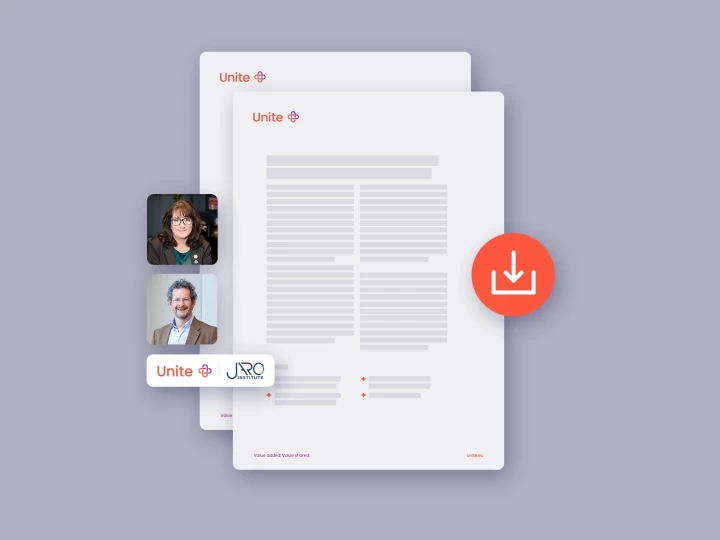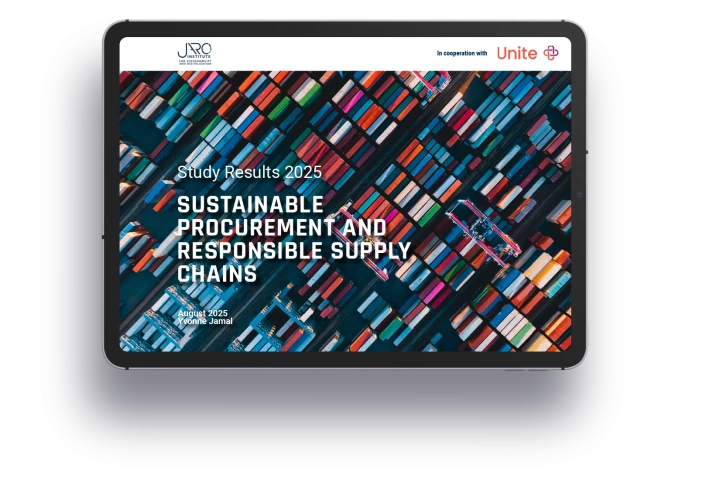Leipzig/Berlin, 08.09.25
The JARO Institute for Sustainability and Digitalisation e.V., in partnership with Unite, has published the study ‘Sustainable Procurement and Responsible Supply Chains 2025’. The results show that businesses are increasingly embedding sustainability into their procurement processes. However, success depends less on political directives and far more on the attitude of company leadership.
Leadership as a success factor and legislation as a driver
The study reveals:
78% of respondents see a clear commitment from organisational leadership to strategic procurement as the most important driver for sustainable supply chains.
Legal regulations follow in second place (53%), providing essential impetus, but rarely translating into effective action without strong leadership.
Equally significant is the ability of senior management to communicate the value of sustainable procurement convincingly (51%).
The results underline: legislation sets the framework, but it is leadership that sets the direction for sustainable procurement.
Challenges on the path to sustainable procurement
Despite progress in leadership and regulation, the study highlights that companies are facing new obstacles. Cost is a particularly prominent issue: although knowledge of sustainable procurement is increasing, there is a noticeable decline in willingness to pay higher prices. Only 32% of respondents are now prepared to pay more for sustainable options, which is a decrease of 12 percentage points compared to the 2023 survey.
Financial considerations, however, are not the only barrier. Organisations continue to face limited resources, both in terms of personnel and budget. Approximately half of those surveyed cite a lack of expertise and insufficient internal capacity as key challenges. Additionally, regulatory requirements are frequently perceived as too complex to implement in practice. The integration of suppliers remains another challenge especially when they do not meet the same sustainability standards or are hesitant to participate.
These factors indicate that, in addition to clear leadership, sustainable procurement requires investment in knowledge, collaboration and resources.
Expert insights
“Sustainable procurement is not an end in itself. It helps to secure competitiveness and take responsibility for global supply chains. However, this requires clear direction from senior management, embedding the topic strategically,” says Yvonne Jamal, CEO of the JARO Institute.
“The results show that sustainable procurement is far more than a strategic trend – it reflects a societal shift towards responsibility, resilience and future viability.” “With more than two decades of experience in this market, Unite closely observes developments in sustainable procurement and has gained valuable insights,” adds Dr Sebastian Wieser, CEO of Unite.
About the study
The study is based on an online survey of over 100 procurement professionals and senior leaders from Germany and across Europe. It’s the third survey in this series, following 2021 and 2023, and examines awareness, motivation, assessment and implementation of sustainable procurement.
About the JARO Institute
The JARO Institute for Sustainability and Digitalisation aims to position sustainable procurement processes and responsible supply chains as the standard in business and administration. JARO wants to motivate and inspire organisations to implement sustainability in their business processes while focusing on the transfer of knowledge to turn theory into practice. To this end, the JARO Institute shares relevant expertise in the form of lectures, workshops, publications, e-learning modules and podcasts. They also focus on the aspect of networking with stakeholders to promote the 17 Sustainable Development Goals laid out by the United Nations (Agenda 2030). Founded in 2018, JARO is a non-profit organisation based in Berlin. Its member network is committed to sustainable business.
Find out more about the JARO Institute: https://jaro-institut.de/
About Unite
Unite connects the economy for sustainable business. The trusted e-procurement platform with its integrated marketplace enables effortless sourcing and purchasing for private and public sector organisations.
Bringing buyers and suppliers together for mutual benefit, Unite has
established a solid foundation of fair competition and trustworthy partnerships. The platform’s scalable infrastructure supports connections, business stability and a robust supply chain.
Unite revolutionises procurement for the private and the public sector by adding and sharing value for markets and communities. In 2022, Unite became the first platform business accredited with the Fair Tax Mark, representing the global standard for responsible tax practices. The company is also certified with the EcoVadis Gold label for its commitment to sustainability.
Unite was founded as Mercateo in 2000 and is headquartered in Leipzig, Germany. It operates in 12 European countries, with over 700 employees working both in-office and remotely. In 2024, Unite achieved revenue of €448.7 million.
For more information, visit unite.eu.

Download
Includes press release (PDF), photos of authors and logos (JARO & Unite).
Need more information? Contact us! communications@unite.eu

Everything you need for your reporting
We are happy to provide you with background information, interview partners or further expert opinions.
